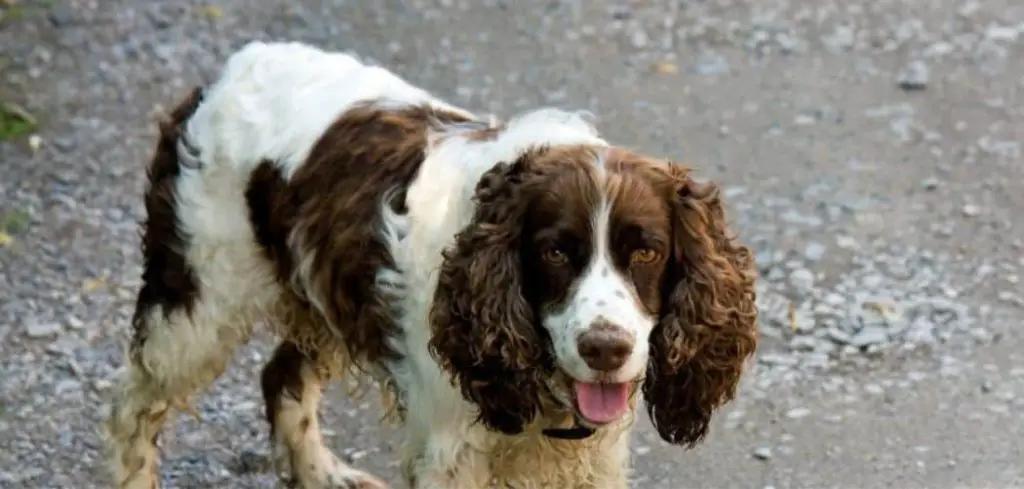It can be alarming when your old dog seems to eat normally but continues to lose weight.
Senior dogs are at higher risk for underlying medical issues that affect nutrient absorption or metabolism, making unexplained weight loss a serious concern.
We outline the common causes of an old dog eating but losing weight, what you can do at home, and when to seek veterinary help.
Old Dog Eating But Losing Weight — Why It Happens
Weight loss in old dogs that continue to eat normally often signals an underlying health issue rather than a simple dietary problem. Conditions such as organ disease, digestive disorders, metabolic changes, dental issues, or even cancer can prevent a dog from maintaining a healthy weight.
Additionally, older dogs may burn calories faster or absorb nutrients less efficiently, even if their appetite appears normal.
Monitoring for other symptoms like lethargy, vomiting, diarrhea, or behavioral changes is key to identifying the root cause.

Old Dog Eating But Losing Weight: Common Causes
Kidney Disease
Kidney disease is common in senior dogs and can cause significant weight loss despite a normal appetite. Diseased kidneys fail to filter waste efficiently, which leads to loss of protein and nutrients from the body.
Signs may include increased thirst, frequent urination, vomiting, and decreased energy.
Weight loss can progress gradually, and because appetite often remains intact, owners may not realize a problem exists until significant muscle mass is lost.
Read more: Old Dog Lethargic and Not Eating (Signs your senior dog needs care)
Diabetes
Diabetes mellitus in older dogs can lead to weight loss even when they are eating well. The body cannot properly process glucose, so energy from food isn’t effectively absorbed.
Look for increased drinking, urination, and sometimes changes in coat condition. Persistent weight loss is serious because uncontrolled diabetes can result in life-threatening complications, including diabetic ketoacidosis.
Digestive Disorders
Digestive issues, such as exocrine pancreatic insufficiency, inflammatory bowel disease, or chronic infections, can prevent proper nutrient absorption. Dogs may appear to eat normally but still fail to gain or maintain weight.
Owners may notice loose stools, flatulence, or changes in appetite. These disorders are significant because chronic malnutrition can weaken the immune system and lead to other health problems.
Dental Problems
Dental disease can interfere with how effectively a dog chews and digests food. Pain from decayed or infected teeth may cause a dog to eat less thoroughly or avoid certain textures, indirectly leading to weight loss.
Signs include bad breath, drooling, or dropping food while eating. In older dogs, dental care is crucial not only for comfort but also for maintaining healthy weight and nutrition.
Cancer
Certain cancers, including gastrointestinal tumors or systemic malignancies, may cause rapid weight loss even when appetite is normal.
The body’s metabolism can be altered, and tumors may interfere with digestion or nutrient absorption.
Symptoms can include lethargy, vomiting, diarrhea, or changes in coat quality. Early detection is critical because some cancers can be managed more effectively if treated promptly.
Hyperthyroidism
Although rare in dogs compared to cats, thyroid disorders can occasionally cause weight loss in older dogs.
Overactive thyroid glands accelerate metabolism, leading to a dog burning calories faster than they consume.
Signs may include restlessness, increased appetite, and behavioral changes. Left untreated, hyperthyroidism can strain the heart and other organs, making early veterinary evaluation important.
What to Do If Your Old Dog Is Eating But Losing Weight
Start by tracking your dog’s daily food intake, weight, and any noticeable symptoms. This record helps your veterinarian identify patterns and potential causes.
Ensure your dog is receiving a high-quality diet appropriate for senior dogs. Diets rich in digestible protein, healthy fats, and essential nutrients support weight maintenance and overall health.
Monitor hydration closely, as older dogs are more prone to dehydration, especially if they have kidney or digestive issues. Provide fresh water at all times and consider wet food to supplement fluids if appropriate.
Keep an eye on eating habits and comfort. Dental issues or joint pain can affect how your dog consumes food. Adjust feeding methods, such as softening kibble or raising bowls, to make eating easier.
Maintain regular veterinary check-ins. Even if your dog appears otherwise healthy, unexplained weight loss warrants a thorough examination, bloodwork, and possibly imaging to rule out serious conditions.
When to Call or Visit Your Vet
Immediate veterinary attention is necessary if your old dog:
- Shows rapid or severe weight loss over weeks.
- Displays vomiting, diarrhea, or blood in stool or urine.
- Appears lethargic, weak, or disoriented.
- Has changes in appetite, water consumption, or behavior that accompany weight loss.
Even slower, progressive weight loss should not be ignored. Senior dogs often mask symptoms until the condition is advanced, so early detection significantly improves treatment options and outcomes.
Read more: Old Dog Not Eating (Could indicate underlying illness)
Key Takeaway
Weight loss in an old dog that continues to eat normally is a clear sign that something may be wrong internally.
While diet, metabolism, and age-related changes play a role, serious medical conditions like kidney disease, diabetes, digestive disorders, dental problems, cancer, and thyroid issues should be considered.
Home monitoring and supportive care can help, but persistent or unexplained weight loss always requires veterinary evaluation.
With timely intervention, many causes can be managed effectively, helping your senior dog maintain health, energy, and quality of life.
